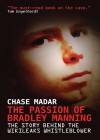The Passion of Bradley Manning: The Story Behind the Wikileaks Whistleblower
Written by: Chase Madar Verso,
London & New York, 2012,
ISBN 9781781680698, 188pp
Reviewed by: Steven L. Jones
The Passion of Bradley Manning was always going to be a polemic book. While Manning’s release of confidential information to Wikileaks is taken as fact, opinion is divided as to the moral nature of his actions. For his detractors, he is a dangerous traitor of the highest order and deserving summary execution for undermining national security and providing support to the enemies of freedom and justice. For his supporters, he is a martyr of the highest virtue. While the truth is obviously somewhere in between, Madar’s book sits firmly in the latter category. While the book deals with matters specific to American politics and operations, it poses universal questions and offers a case study relevant to the Australian Defence Force (ADF).
Madar’s book certainly has many faults. While a strongly partisan book is not inherently bad, this one is characterised more by rhetoric than analysis, and there is very little original research. This is essentially not a book about Manning, but about the political and military system which Manning supported but then rejected. The purpose of the book is to direct the spotlight from the criminal and personal specifics of the case to the broader political and moral aspects.
Although there has been a great deal of literature dealing with public accountability and the difference between declared values and operational practice in the ‘Long War’, Madar’s book does offer some new insights. Of particular note are the lax information security arrangements which allowed Manning to easily collect and transfer confidential information, and the description of a military under such manpower pressure that Manning was deployed in a high security role despite the numerous warning signs.
In basic training, with recruitment numbers at their nadir, Manning was assigned to the Discharge Unit, but was ‘recycled’ for active service. At 5’ 2” and 115 pounds, Manning was hardly ideal army material physically, not to mention behavioural and psychological issues, which later became evident. As an intelligence analyst at Fort Drum in New York, Manning ‘didn’t get along with his roommates’, was ‘written up tossing chairs around in a fit of rage [and] for yelling at superiors’, was ‘mildly reprimanded’ for broadcasting information about the base on YouTube, protested against Don’t Ask Don’t Tell, and was required to receive mental health counselling. While his superiors discussed leaving Manning behind when the unit was deployed to Iraq, the need for computer savvy analysts overrode their concerns, and he was deployed to FOB Hammer in Iraq in 2009.
While it is tempting to link Manning’s mental and gender issues to his actions, designating the leaking of information as the actions of a social misfit, Madar is keen to define Manning’s actions as a deliberate political act. The valuable core of this book is an account of morality tested in an operational environment, of a strong personally derived morality in conflict with an externally imposed institutional ethic. Madar’s characterisation of Manning, one which is supported by the chat logs, is that of an idealist. Manning believed in America as the exemplar of virtue; he believed in the American values of liberty and democracy and believed in America’s mission of bringing them to Iraq. Madar positions Manning as a patriot, supporting this position with declarations from the Founding Fathers and other great American leaders who articulated the need for transparency in government.
Ultimately, Manning is unable to reconcile the differences between the declared values and ideals of America and the practical ethics of operational necessity. The final straw is a case in which Manning’s unit is involved in the arrest of civilians by the Iraqi Federal Police for producing a pamphlet critical of corruption in the new regime. Realising the essentially democratic actions of the arrested Iraqis and the likelihood of abuse at the hands of the local authorities, Manning takes this information to this superior but is told to ‘shut up and help find more detainees’. After this event, Manning sees things differently, realising that he is a part of something he doesn’t believe in, something which acts against his own and America’s values. Believing that Americans would not support the war if they knew what was happening, the details and the ugly truths, he decided to take a moral stand and reveal confidential information to the world to promote openness and debate.
With future wars likely to replicate the moral quagmire of Iraq and Afghanistan, the differences between military ethics and operational necessity on one hand and national values and civilian morality on the other is an issue requiring serious consideration. A clear understanding of Manning’s motives will have to wait for a more detailed biography, but there is sufficient in this book to warrant its careful study.

